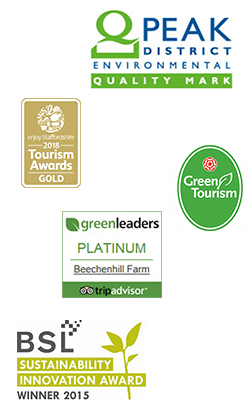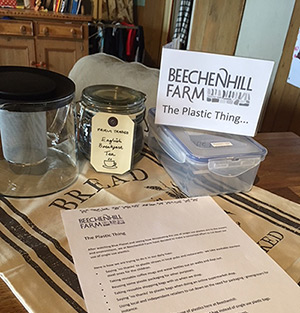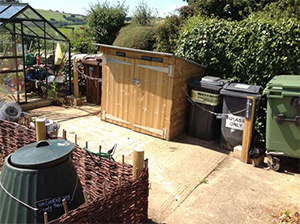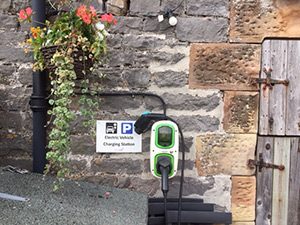Sustainability and Biodiversity
We live here in a beautiful place in the Peak District National Park, an area recognised by the nation as an exceptionally valuable landscape. We have the opportunity to try and live in this beautiful place in a way that improves our environment, uses our resources efficiently and creates as little waste as possible. We are certainly not perfect but are on a journey towards improving what we do and how we do it.
In January 2024 we planted 4,777 native species trees to form an open canopy woodland on 10 acres of the farmland to the north of the farmhouse.
We Support
- Our local community in lots of different ways:
- My local community in lots of different ways: recently Sue Prince Artist created a birds eye view map of Alstonefield, prints of which were sold to residents and raised £1,750 towards the community’s Save the George Pub campaign.
- Wetton and Alstonefield First Responders, local people trained by the ambulance service to respond immediately in emergencies. We collect funds to help them buy essential equipment. Our fund raising total at Dec 2024 was £7,896.26
- Practical Action - technology challenging poverty- a charity finding practical solutions for ordinary people living in difficult conditions
How do we monitor what we do?
- We enter competitions to test ourselves and make sure we are going in the right direction.
- We are proud to have achieved The Peak District Environmental Quality Mark, they monitor our progress every year
- We are delighted to have achieved a Gold Award for the Green Tourism Business Scheme, they monitor our progress every two years. We try to improve our practises to improve our awards
- We are very excited to have been twice highly commended in the Virgin Holidays Responsible Travel Awards- an international award. There were 2000 global nominations!
- We are very proud to have won GOLD in sustainability in the Enjoy Staffs Awards 2018 and silver in sustainability in 2019.

Here at Beechenhill we try to live as sustainably as we can. We have won national and international awards and most recently we won Gold in Sustainability in the 2018 Enjoy Staffs Awards and Silver in Sustainability in 2019. We do lots to look after our environment and lower our impact. Some of the things we are doing:
Plastic
- In 2018 we carried out an audit on what we use and how would could change.
- Provide reusable plastic containers instead of single use plastic bags for food orders.
- Reusable cotton bread bag.
- Plastic free tea bags instead of teabags containing plastic.
- Our laundry now returns bedding in reusable cotton bags instead of plastic wrap.
- Finding a local recycling company who collect and recyce the plastic we do use.

Recycling
- Reduce waste
- Up-cycled (dyed towels, painted furniture etc)
- Reused (given to staff, village, freecycle, sell on using Ebay)
- Recycled (paper, plastic, glass, metal, card, electrical)
- Composted (food waste)
Energy & Heat
- A wood pellet boiler has replaced oil central heating and hot water.
- In 2022 we replaced the old oil Rayburn in the farmhouse kitchen, with an electric Aga so we have finally become fossil fuel free.
- Use waste wood, locally coppiced wood and recycled wood briquettes to heat log fires, sauna and hot tub.
- We have three 4 kw solar photovoltaic arrays on a cowshed roof providing about half of our electricity and helping with charging the electric cars.
- The ceilings of the accommodation have thick sheep's wool insulation to help retain the heat.
- Eco towels use 40% less energy to wash and dry.

Transport
- If we can walk, walk
- If we can use public transport, we try to do so
- If we can share lifts, we share lifts (we can pick up guests from public transport or from local pubs)
- Minimum use of cars, always multipurpose trips
- The family have electric vehicles
- We have 2 electric car charging points, 1 x Tesla and 1 x standard 7Kw

Wildlife
- The way we farmed the land organically protected wildlife. Instead of weed-killer, sheep were used to keep ragwort down, dock beetles ate the dock plants and thistles were manually removed. Nitrogen fixing clover was used rather than fertiliser.
- Now we have retired from farming, a neighbour is renting our fields for sheep and specifically is not using fertiliser or sprays.
- In January 2024 we planted 4,777 native species trees to form an open canopy woodland on 10 acres of the farmland to the north of the farmhouse.
- We keep part of the garden as wild flower meadow, which is a great habitat for insects. No pesticides or fertiliser used in garden. We plant bee friendly flowers & have used the ‘Great British Bee Count’ app to report when we see bees and encourage others to do so.
- Moved a fallen tree to a corner of a field for a home for insects like beetles.
- Maintain the farm’s original dew pond that is home to great crested newts.
- We have installed bird feeders, owl boxes, insect houses and bat boxes.
- In 2018 we cleared out and replanted the neglected garden pond.
Water
- Water meter fitted to mains supply.
- Toilets are flushed using rain water. The rain water is collected via the farm building guttering on the north roofs into a large tank. It is then pumped to the toilet cisterns.
- Rain water from the south facing roofs is collected in a pond that is the home to great crested newts.

